He Xiaohui: A visionary rooted inservice
Updated: 2014-01-17 09:39
By CAI CHUNYING in Gaithersburg, Maryland (China Daily USA)
|
||||||||
Chinese Lunar New Year, which this year falls on January 31, has been celebrated in public schools and government offices in Maryland for eight years now. And Xiaohui He, former president of the Coordination Council of Chinese-American Associations, had a lot to do with it.
In 2006, responding to a petition signed by thousands of Chinese Americansalong with members of Korean and Vietnamese communities who also observe the tradition, then Maryland governor Robert Ehrlichsigned into law an official recognition oftheholiday, putting it on the state's calendar.
He's organization was the key player in mobilizing the local Chinese community and gaining support for the bill.
"The recognition has a far-reaching effect,"said He, a resident of Gaithersburg, Maryland, who now sits on advisory boards of both the state and county's committee on Asian American affairs. "It helps to educate American society about Chinese culture and tradition."
"Public schools started to teach about theholiday. We also saw government buildings being decorated with Chinese themes around that time each year,"she said, adding that she has also been attendingthe governor's annual Lunar New Year party, a ritual since 2006.
XiaohuiHe's 20-year love affair with the Chinese community in the greater Washington area started with a simple hobby: singing.
In 1994, six years after coming to the US, He founded the cultural and performance-based Yellow River Art Ensemble, help local Chinese Americans connect with their heritage.
"There are many Chinese in the area who were musicians and performing artists back in China. They had to give up their artistic pursuit and rarely had chance to pick it up. What a pity! The ensemblehelped to take us back to those old days singing our favorite songs," He said.
During the Autumn Festival that year, the group staged their first show, drawing more than 1,000 Chinese from as far away as Philadelphia.
Twothings happened that moved Xiaohui He beyond cultural activities and into civic advocacy.
The first was in 1995 when He applied for federal funds for her nonprofit. She learned from an on-line listthat Jewish organizations got funds in the millionseach year while Chinese American groups only got grants in the thousands.
"I was shocked to see the difference," she said. "I realized that as a minoritygroup we really needed to form a more powerful community entity and reach out actively for support."
The second event was a well-publicized case - Wen Ho Lee's espionage chargein 1999. Lee, a Taiwan-born scientist who worked for Los Alamos National Laboratory, was indicted on 59 criminal counts of spying for the Chinese and put in solitary confinement for more than nine months.
The FBI dropped the case within a year and only charged Lee with mishandling classified data. President Bill Clinton issued a public apology to Lee over his treatment. Lee later said that his Chinese ethnicity was a primary factor behind his prosecution.
"I remember at the time I could not imagine what I would doif I were Wen Ho Lee. I would feel so powerless," said He. "There was no Chinese-American organization to stand up for him."
From then on, He devoted herself to building a Chinese community that could be a powerful advocate in difficult times.
In Washington at the time, there were many small groups, so called "hometown associations", that were established to bring together people from the same province or city in China.
"I thought the best thing was to first form an umbrella organization togroup those hometown associations together - because everyone comes from somewhere in China," He explained. "So this organization could bea home base for Chinese from all walks of life."
In 2002, the Coordination Council of Chinese-American Associations was born.
For the next fiveyears serving as deputy, He helped organize Chinese participation in many large-scale activities, some for the first time, such as the Independence Day Parade in Washington DC, the Memorial Day Parade in Montgomery County and Asian Pacific Heritage Month.
"Chinese as immigrants tend to bond with each other in Chinese culture and traditions, which is natural and should be encouraged. But as an organic part of a new society, we need to do more to let local government and fellow citizens know we are here, we belong and we care about the society," He said.
He's effortsattracted the attention of the state government. In 2010, she won the Governor's Volunteer Service Award, the only Asian American among the 33 recipients.
He's full-time job is as a program associateat the language and culture institute of Virginia Tech, where she got a Master's degree in natural resources.
"Oddly enough, I do not have big ambitions in my personal career," soft-spoken He said. "I seem to always find great pleasure in doing community-oriented things."
She became president of her organization in 2007 andstarted to devote more energy towards her larger goal of engaging Chinese Americans in mainstream politics, from voter registration to fund-raising for election campaigns.
"Even though we came from China we are still authentic members of the United States. We need to follow its system in order to get assimilated and have our voice heard and needs met," said He.
"The more voting power a group has, the more attention it will get from elected officials. Besides, voting is a privilege and we have the obligation to use it," He explained.
He knows it is not an easy road.According to statistics, the voting rate among Chinese Americans is less than 25 percent, much lower than other Asian American communities such as Indians and Koreans.
He would set upvoter registration tablesather manycommunity events. She helped to organize the first-ever town hall meeting for Chinese Americans to meet representatives from both the Obama and McCain campaigns during the presidential electionof 2008, the year that she herself became a US citizen.
"I often feel like I am still a dreamer even at this age," He, who is in her late 50s, said with a laugh.
Her next dream is to form an overarching committee, participated in by leaders of main organizations in the Chinese community who could meet regularly to design development plans for the communityas a whole.
Asked if there was a model for that dream, He laughed and said, "Probably the UN."
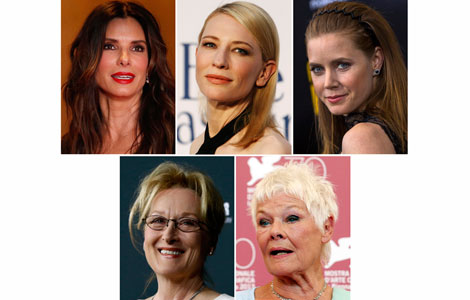
 'American Hustle,' 'Gravity' lead Oscar nominations
'American Hustle,' 'Gravity' lead Oscar nominations
 Wildfire out of control in Los Angeles, US
Wildfire out of control in Los Angeles, US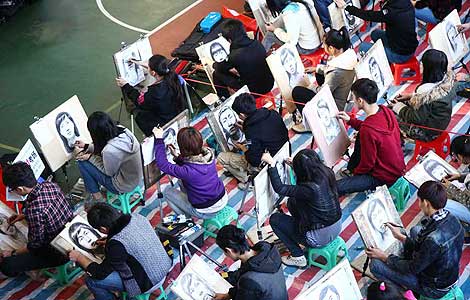
 Way to art school
Way to art school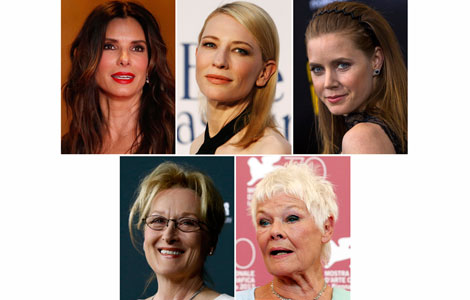
 'American Hustle,' 'Gravity' lead Oscar nominations
'American Hustle,' 'Gravity' lead Oscar nominations
 138th Westminster Kennel Club Dog Show to open
138th Westminster Kennel Club Dog Show to open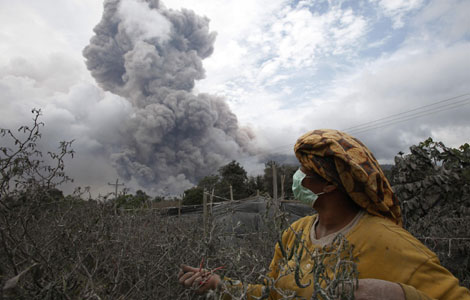
 Volcano displaces thousands in Indonesia
Volcano displaces thousands in Indonesia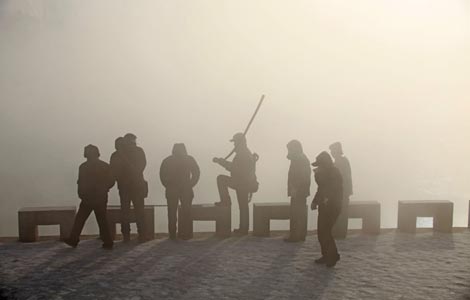
 China issues fog alerts
China issues fog alerts
 Stray cats on the way to be slaughtered saved
Stray cats on the way to be slaughtered saved
Most Viewed
Editor's Picks

|

|

|
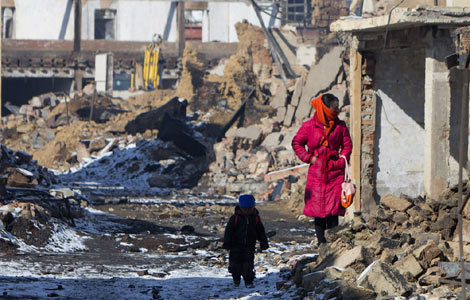
|

|

|
Today's Top News
Auto-glass maker invests $200 million for US plant
Consul General lauds progress in 2013
Teaching English in China a good Plan B
China's US debt holdings reach record high
US Treasury chief says high-level engagement 'welcomed'
Asiana firefighters saw victim alive
US 'double standards' threaten other nations
Obama set to speak about NSA
US Weekly

|

|







